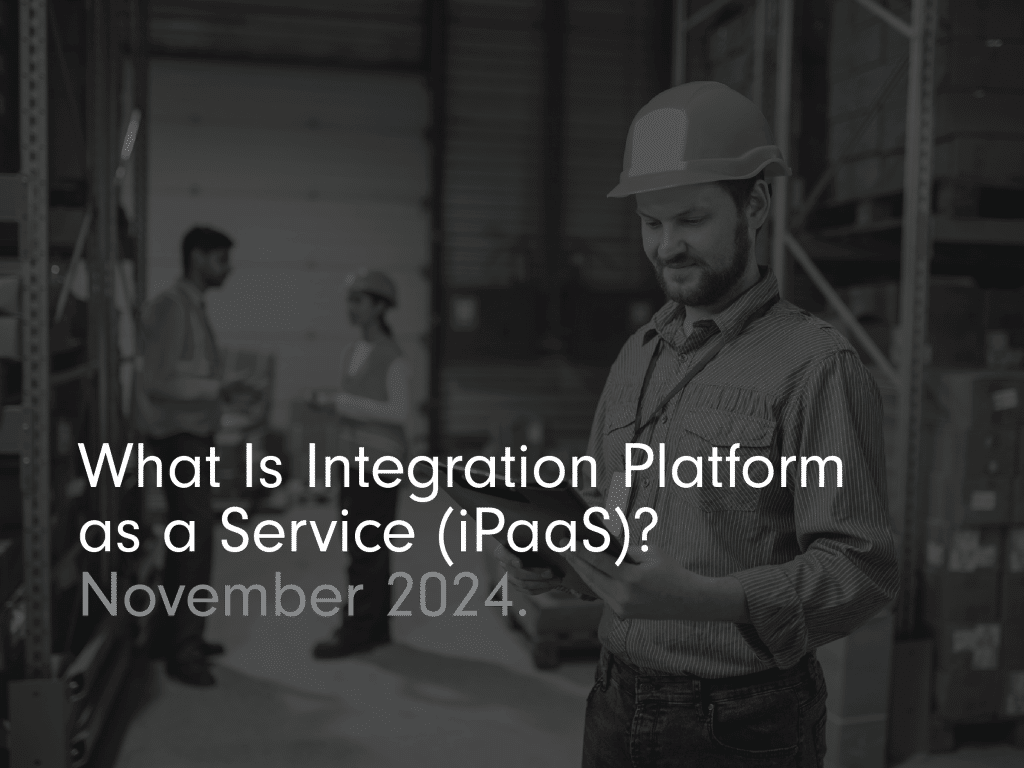What Is Integration Platform as a Service (iPaaS)?

Businesses are always looking for better ways to connect different systems and make operations smoother. That’s where iPaaS, or Integration Platform as a Service, comes in. This cloud solution helps link various apps and data across different environments, making sure data flows smoothly and operations run better. iPaaS acts as a bridge, connecting online apps, on-site systems, and other data sources.
As organizations rely more on diverse software, they face the challenge of making these systems work together. iPaaS is a key solution. It helps businesses handle complex integrations without much manual work.
By automating integration processes, it saves time and effort. This allows IT professionals and business owners to concentrate on core business activities.
Understanding Integration Platforms.
What are Integration Platforms?
An integration platform is a set of tools that helps connect different software systems and services. These platforms ensure that data, applications, and processes can work together smoothly. They provide a unified environment for managing business operations.
Types of Integration Platforms
Integration platforms come in different forms. These include on-premises integration, cloud integration, and hybrid solutions. On-premises integration connects systems within one data center.
Cloud integration extends these connections to cloud-based applications. Hybrid solutions use elements of both on-premises and cloud integration. This offers flexibility and ease of adjustment for various needs.
Benefits of Using Integration Platforms
Using an integration platform has many benefits. It improves data integrity, boosts collaboration, and cuts running costs. By automating data integration, these platforms remove redundancies and errors. This ensures that information is accurate and easy to access for decision-making.

How it works
Overview of Architecture
iPaaS works using a cloud-based setup. It offers a scalable and flexible way to connect different apps and data sources. It uses pre-built connectors, APIs, and integration flows to help data move smoothly between systems. This setup allows organizations to manage and monitor integrations easily, ensuring data flows smoothly across the network.
Understanding Data Sources and Data Flows
At the heart of iPaaS is its ability to connect with various data sources. These range from SaaS applications to older systems. iPaaS helps keep information updated and accessible across the organization by managing data flows. This process includes changing data formats, mapping fields, and syncing records to keep data accurate.
Integration Solutions Offered
iPaaS solutions provide various integration features. This includes application integration, data integration, and business process automation. These tools help businesses connect applications easily, simplify workflows, and boost productivity.
For example, they can automate customer relationship management (CRM) processes or sync inventory data. iPaaS offers the necessary tools for smooth integration.

Benefits of using iPaas
1. Streamlined Integration Process
iPaaS offers a streamlined integration process that eliminates the need for manual coding and programming. This makes it easier and faster to integrate new applications into an existing system without disrupting current operations. With pre-built connectors and drag-and-drop interfaces, businesses can quickly set up connections between applications and automate data transfer between them.
2. Improved Data Management
With iPaaS, businesses have better control over their data management processes. It allows them to centralize their data and keep it updated across all systems, ensuring consistency and accuracy. This ensures that all departments and teams are working with the same data, avoiding data silos and discrepancies.
3. Cost-Effective Solution
iPaaS is a cost-effective solution for businesses of all sizes. It eliminates the need for expensive hardware or software installations, reducing upfront costs. Additionally, it reduces maintenance costs as updates and upgrades are handled by the provider. This allows businesses to save on IT resources and focus on their core operations.
4. Faster Time-to-Market
By simplifying the integration process, iPaaS allows businesses to bring new products and services to market faster. This gives them a competitive edge and the ability to respond quickly to changing customer needs. With a more agile and efficient integration process, businesses can also launch new partnerships, collaborations, and innovations at a faster pace.
5. Scalability
iPaaS is very scalable, meaning it can grow with a business. When a company expands and adds new systems or apps, iPaaS can easily connect with them. It does this without causing any disruptions or delays. This allows businesses to keep up with growth without having to invest in expensive and time-consuming IT solutions.
6. Ease of Access
With iPaaS, businesses have access to their data and applications from anywhere at any time. This makes it easier for teams to collaborate remotely and for employees to work remotely without any limitations. This level of accessibility also enables businesses to quickly respond to changing market conditions and make informed decisions based on real-time data.

Choosing the Right Solution
Factors to Consider in Selecting an iPaaS Vendor
Choosing the right iPaaS vendor is crucial for getting the most out of integration. Consider the vendor’s history, support services, scalability, and pre-built connectors. A good vendor will provide an easy-to-use platform with strong security to protect sensitive data.
Meeting Your Integration Requirements
Understanding your group’s unique integration needs is important when choosing an iPaaS solution. Consider how complex your integration requirements are and how many applications you need to connect. Also, think about the expected data volumes. Look for features you can customise and flexibility that allows you to adjust the platform to fit your specific business processes.
Growth and Ease of Integration
Scalability is crucial for growing businesses. A strong iPaaS solution should handle more data and integration needs without slowing down. An easy-to-use interface and good monitoring tools help IT teams manage integrations better.
Our Expertise in WMS and Cloud Integration
Balloon One specializes in connecting Warehouse Management Systems (WMS) with cloud platforms. This is a key part of our skill in iPaaS solutions. By linking WMS with different cloud services, we help businesses see their inventory better. This improves efficiency and provides access to real-time data.
This integration streamlines logistics operations. It ensures that inventory levels are synchronized across all platforms. Supply chain processes are also optimized.
We have a strong grasp of both WMS and cloud integration. This shows our ability to provide solid iPaaS solutions. With our help, your business stays agile and competitive in a fast-changing digital world.

Future of Integration Platforms as a Service.
Emerging Trends
The future of iPaaS is set for growth and new ideas. One trend is adding AI and machine learning to boost automation and decision-making. Also, iPaaS platforms are using low-code/no-code interfaces more. This allows non-technical users to build and customize integrations easily.
Predictions for the Future of Integration Platforms
As technology evolves, integration platforms will be key to digital transformation. Organisations can expect better integration and stronger security features. There will also be more support for new technologies like blockchain and IoT. The future promises smoother, more efficient, and smarter business operations.
Conclusion
iPaaS is a key tool for smooth operations and better data management. It helps companies stay competitive. iPaaS connects different systems and automates complex tasks, allowing organizations to succeed in the digital age.
As businesses grow, iPaaS becomes more important. It connects different applications and data sources. This helps organizations use their technology better. Whether you’re in logistics, a business owner, or an IT expert, iPaaS can lead to more efficiency, flexibility, and success.
Frequently Asked Questions.
iPaaS means Integration Platform as a Service. It’s a cloud-based solution that connects different applications and data sources. This helps streamline business operations.
Unlike traditional methods, iPaaS offers cloud-based growth, automation, and ready-made connectors, reducing manual work and speeding up integration processes.
Yes, iPaaS is built to manage complex integrations. It offers customizable features and advanced automation to meet various business needs.
Absolutely, iPaaS is scalable and adaptable, making it suitable for organisations of all sizes, including small businesses seeking efficient integration solutions. It allows small businesses to save time and resources while improving overall operations.
SaaS means Software as a Service. It delivers software over the internet. Users can use it through web browsers without downloading or installing it.
SaaS usually works with a subscription. Users pay regularly to access the software. It is scalable, flexible, and cost-effective for businesses compared to traditional software methods.